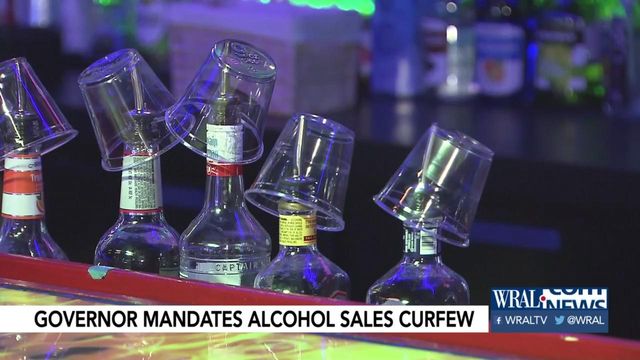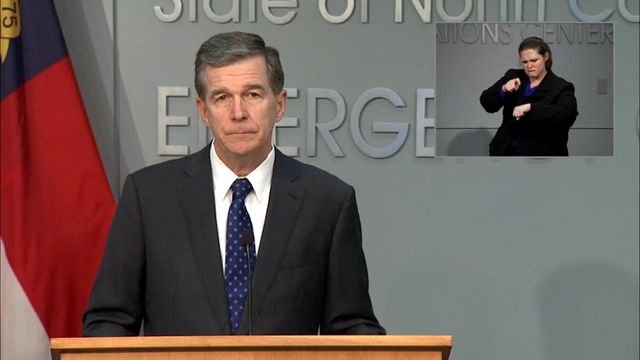Cooper issues statewide restriction on late-night alcohol sales
To limit the spread of coronavirus, Gov. Roy Cooper said Tuesday that he's implementing a statewide restriction ending all alcohol sales for on-site consumption at 11 p.m. nightly, starting Friday.
Posted — UpdatedCooper said evidence from a number of states has shown bars to be sites of viral outbreaks – bars have been closed in North Carolina since March – and that some restaurants in North Carolina "essentially turn into bars late at night."
"People are less socially distant and less sitting at tables and more milling around and more up around the bar," he said. "This is one of the ways that we believe will be effective in driving those [statewide virus] numbers down if we want to discourage that bar-type scene in a restaurant."
Joe Lumbrozo, a chef at Backyard Bistro, said that he hasn't seen such activity at his restaurant.
"I agree with the governor that we need to take as many precautions as we can to get this COVID pandemic under control, but as a restaurant owner and as a restaurateur, I'm just not sure how many more blows we can take," Lumbrozo said.
Restaurants statewide were limited to takeout and delivery orders from late March until late May, and they still are required to operate at half capacity after investing in plastic screens, masks, sanitizer and other protective gear to keep customers and employees safe.
"More than half the restaurants in North Carolina and across the nation are going to close and not open back up," Lumbrozo said. "I'm sure there are many, many locations [where] this is going to be one more nail in the coffin."
Zack Medford, president of the North Carolina Bar and Tavern Association, said Cooper's executive order underlines the double standard his shutdown orders have created.
"Over the past four months, private bars have tried everything from catering in food, adding food trucks and even adding food themselves" in order to reopen, Medford said in a statement. "But they were shut down by Alcohol Law Enforcement on orders from the governor. Yet, new restaurant bars have been allowed to open during that time with entirely new permits and then turn around and act like bars."
Cooper said the restriction on late-night alcohol sales is especially important as universities reopen across the state in the next few weeks, bringing tens of thousands of students to North Carolina from across the country and from foreign lands.
Dr. Mandy Cohen, secretary of the state Department of Health and Human Services, noted that young adults have been a major driver of the continued growth in North Carolina's coronavirus caseload in recent weeks.
Cohen noted in the briefing that the number of new cases statewide and the percent of positive coronavirus tests are beginning to stabilize.
"Seeing glimmers of potential progress doesn't mean we can let up. We need to double down," she said.
Cooper agreed that "stable is good, but decreasing is better," which is why he's trying to target late-night partying instead of issuing a wider shutdown order to squelch the virus.
Local law enforcement, state ALE agents and the state Alcoholic Beverage Control Commission will enforce the sales prohibition, Cooper said. Violations are a Class 2 misdemeanor, but the ABC Commission also could take action against violators' liquor licenses.
The statewide action follows similar moves in Raleigh and Orange County in recent weeks.
Because both of those ordinances are stricter, the executive order won't affect them.
• Credits
Copyright 2024 by Capitol Broadcasting Company. All rights reserved. This material may not be published, broadcast, rewritten or redistributed.






